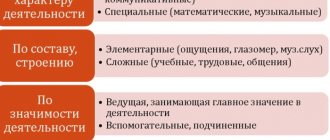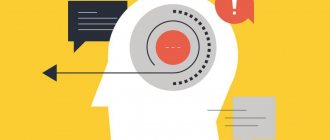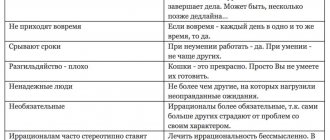All people are different, it’s hard not to notice. But they differ not only in appearance or character traits, but also in their abilities. And we all, to be honest, no, no, let’s sigh enviously - well, there are capable and talented people, and why don’t we have such talents? Abilities are one of the significant, valuable qualities, because success, fame, and material well-being are associated with them. What is this, maybe a gift from God, and someone has it, but someone is deprived? Let's figure out whether it's worth complaining and envying or whether it's better to gain these abilities and be proud of yourself.
Definition of the term “ability” in psychology
In psychology, abilities are properties of the human psyche, determined by the special development of functional organs and psychological structures, which allow him to master new knowledge, skills and abilities in a specific field of activity with particular speed and success.
For people who have certain abilities (in a specific field of activity), the speed of mastering new knowledge and skills is several times higher than the effectiveness of development in this area for those people who do not have such abilities.
For example, if a child has mathematical abilities (ease of arithmetic calculations, good memory, pronounced logical thinking), it is much easier for him to study mathematics and solve complex problems, unlike a child who does not have these abilities.
To successfully master and carry out different types of activities, different abilities are required. The speed and quality of acquiring new knowledge, skills and abilities in the relevant field of activity depends on them.
Inclinations are the natural basis of abilities
Abilities are, in psychology, personality traits that determine the speed and quality of mastering knowledge, skills and abilities. The initial form of future abilities are inclinations, which are hereditary anatomical and physiological characteristics of the body, which can manifest themselves in the form of the following properties of the nervous system:
- Special perception of artistic forms, sounds or colors (the ability to recognize or analyze them, quickly memorize or reproduce them).
- High sensitivity of the nervous system.
- The pursuit of knowledge, high activity in public relations.
- Good memory and logical thinking, ability to analyze or generalize.
The difference between inclinations and abilities is that they are not specific and cannot specifically relate to any one activity or to any particular ability. The same inclinations can be used in the formation of different abilities in different fields of activity.
For example, excellent eyesight and innate attentiveness can become part of the abilities of an artist or professional archer. Different types of activities require certain abilities, which in turn can be based on the inclinations they require.
The makings of the visual system can be used in activities that require good vision (fine arts, sports). The inclinations of the speech apparatus can be successfully used in a field that requires a high level of its development (oratory, linguistics).
Inclinations are the basic “bricks” on which a person’s abilities and all professional activities are built. They begin to appear in preschool and early school age. During this period, the functional development of areas of the brain responsible for the coordination of the organs of movement, the logic of thinking, as well as the improvement of various analyzers occurs:
- vision;
- hearing;
- touch.
The discovered inclinations in the child must be developed in relation to the area of activity that interests him. As a result, the formation of abilities will take place more effectively and meet the necessary requirements of this activity.
Origin of abilities and their structure
There are 2 theories of the origin of human abilities. The theory of the emergence of abilities through the transfer of genetic information from parent to child and the theory of the development of abilities as a result of training, upbringing and the influence of the external social environment on a person.
The genetic theory of the emergence of abilities is based on well-known facts, when the children of outstanding scientists or artists also became scientists or achieved success in the relevant field of art. For example, a very common occurrence was the discovery of appropriate musical abilities in children of musicians (Mozart, Haydn).
Another striking example is the emergence of a whole dynasty of musicians and composers among the descendants of the famous great composer Johann Sebastian Bach.
The theory of the emergence of abilities under the influence of training and factors of external social influence is based on a number of experiments that confirm the development of almost any abilities, in the case of correct and systematic training of a person by experienced teachers, as well as as a result of proper upbringing in early childhood, when the main anatomical and physiological components are formed child's psyche.
As a result of the coexistence of these theories, modern psychology accepts them equally. The formation of abilities is influenced by both heredity and environmental factors, which can compensate for the lack of any innate abilities or, on the contrary, suspend their development.
The basic structure of abilities (in a general sense) consists of the following parts:
- Information part (knowledge about the world and society, scientific knowledge, knowledge about ways to carry out certain actions in various types of activities).
- The psychophysical part (experience in carrying out certain actions in the field of activity being mastered, expressed in specific skills and abilities).
- The creative part (the ability and willingness to find new types of solutions to any problems, the ability to create more effective skills and abilities).
- The emotional part (the ability to form positive emotions in relation to the activity being carried out, the ability to use emotions to more effectively master skills).
The presence of the above elements in the structure of abilities allows a person to effectively develop his abilities in any field of activity.
The development of individual elements of the ability structure affects the overall progress of the development of the ability itself, which in turn leads to a further strengthening of the development of its individual parts. Thus, the development of an ability is a mutual cyclical process involving the ability itself and its individual parts.
The structure of the ability of any specific activity, in addition to the general structure, will include a number of additional qualities that a person performing this activity must have.
For example, the structure of abilities that a person engaged in musical activity must have includes such elements as a sense of rhythm, an ear for music, and musical memory.
With regard to literary activity, in addition to the general structure of abilities, it should include such additional elements as clear functioning of the speech apparatus, a developed sense of aesthetics, the need for self-expression and fantasy.
Each specific type of activity has its own structure of abilities. A person carrying out any type of activity must have the appropriate abilities.
Inclinations are the natural basis of abilities
Abilities have a complex structure. Among the qualities and properties of a person, which are united by the concept of “ability,” there are natural ones (congenital or hereditary). This natural basis of abilities is called inclinations. These include primarily psychophysiological and anatomical-physiological features.
- For example, the type of higher nervous activity or temperament - in a number of professions people with a sanguine temperament are more successful, and in others - phlegmatic or choleric people. And the sensitivity of a melancholic person can make him a great artist or poet.
- The inclinations also include innate features of the sensory system. For example, a person with a high sensitivity to color discrimination can become a good colorist, and a person with an ear for music can become a musician.
- In order to become a long-distance runner, you need a large lung capacity and endurance, and to play basketball, you need to be tall.
But the key word “can” determines the role of inclinations in a person’s life. Inclinations do not predetermine a person’s life path and may not develop into abilities, but remain “ballast”. On the other hand, the ability to perform certain activities can be developed even with weak natural prerequisites, if there is a desire. It will just take more effort and time, and not everyone needs it. For example, it has now been proven that with due persistence, anyone can learn to draw.
Inclinations are prerequisites, a kind of potential that still needs to be developed to the level of ability. And in this development, the main role is played by the social factor - the environment in which the personality is formed, the social environment, incentives and motives.
Social factor
Along with inclinations, abilities include a set of skills, abilities and knowledge related to specific activities. And only if they are present will the makings work. The formation of abilities includes a number of processes that are in one way or another related to the interaction of society and people.
- Development of potential, which is only possible through activity. That is, to become a musician, you need to learn to play at least one musical instrument. To become a writer, you must not only be able to write, but also know the laws of style, composition, etc. But most importantly, you must engage in the activity for which you want to develop abilities. They just won’t fall like manna from heaven.
- Any ability is a complex and, in addition to inclinations, includes many personal qualities. Thus, for abilities in the field of artistic creativity, the development of imaginative thinking, imagination, and intuition is important, and for success in the exact sciences, abstract logical thinking is required.
- Mastering an activity is a prerequisite for developing abilities. This involves training in techniques, methods, and techniques of activity. If a person with good abilities as a swimmer does not learn to swim, then these abilities will never manifest themselves.
Thus, abilities are the result of the development of all spheres of personality. Moreover, it is possible to develop abilities and transform potential inclinations into real mastery at any age. Although it is best, of course, to begin the development process in childhood, when the psyche is more flexible, and perception is lively and vivid, and any activity is mastered in a playful form.
Proper upbringing and sensitivity to the needs and interests of a child are a guarantee that he will grow up to be a capable person. And you need to pay close attention to the kids. The fact is that there is one interesting mental phenomenon that can suggest the presence of inclinations and the possibility of developing abilities for a certain type of activity. These are inclinations.
What are tendencies?
We approach different types of activities differently - we categorically do not like something, we would like to do something, but there is not enough time, and we always find time for some activities even at the expense of our own rest or household chores.
- There are types of activities that a person has a penchant for, that is, a literally irresistible desire to engage in them. He strives for this, overcoming obstacles, making a lot of effort to master the activity he likes, enjoying the process itself. Psychologists believe that aptitudes are an indicator of a person’s potential abilities for an activity he or she likes. And if there are no inclinations, and the activities do not bring pleasure, and the result is uninteresting, then most likely it will not be possible to develop abilities.
- True, along with true inclinations there are also imaginary ones. They most often appear under the influence of a feeling of envy, when a person likes the result of the work of others so much that he also wants to learn the same thing, for example, to draw, or achieve success in sports, publish his own book, etc.
Imaginary inclinations can arise as a result of imitation. In childhood, it often happens that a child goes to a sports section or art school after his friend, without experiencing any interest in the activity itself. Or girls often want to become singers, imitating their favorite actress.
It is not difficult to distinguish imaginary inclinations from true ones. Mastering the activity in this case is not enjoyable, and the very first failures lead to loss of interest.
Top 23 Essential Skills
To the definitions above, I will add that skills develop us, help us move forward, achieve more and improve. While habits can be both useful and harmful. Read more about habits using the links.
Here is a list of skills that help us become better, more in demand in communication or at work. If you want to add something, or know any other top skills, write in the comments. Most likely, I will add them to this article too.
Ability to study correctly
Learning agility is a willingness to learn something new and an openness to new experiences. A person knows who to learn from and how to learn correctly. Also, the more developed this skill is, the faster a person learns - he has a higher so-called learning index.
I believe this is the most important skill in life. After all, if it is pumped up, then we will instantly be able to acquire new skills and knowledge. And, most importantly, we will know who to learn from.
A person achieves important things in life if he does not give up when he fails, but learns new things and strives to develop further. For example, many professions now require restructuring due to coronavirus and the development of new technologies. Accountants used to work manually, but now through the C1 program, taxi drivers through walkie-talkies, and now through applications, etc.
I have a friend who, back in April 2022, was sent to work remotely as a technical support specialist for an Internet provider due to coronavirus. And she needed to “pull up” her knowledge and skills in the field of IT in order to meet the company’s requirements. If she couldn't learn, what would happen to her? Dismissal! But her learning ability allowed her to work at home and adapt to new requirements.
Here is a very helpful video that will help you understand why this is the most important skill. Be sure to watch it - it will change your life!
Self-discipline
Self-discipline is the ability to sacrifice short-term pleasure for long-term gain.
This skill in human behavior is extremely important. It allows you to tune in even to your least favorite job to achieve high results. If it were not for self-discipline, we would not see famous gymnasts, swimmers, football players, doctors, and businessmen.
Let me give you a basic example. You need to get up early tomorrow to have time to iron your clothes, get yourself ready and go to the meeting. But you want to watch another episode of an interesting series, go to bed after 24:00 and, naturally, get up in the morning later than your alarm clock. As a result, you either fly out like a slob, or the meeting is completely canceled. Failure creeps up unnoticed...
Control and management of your finances
Financial literacy is the discipline in managing your own financial resources, controlling income, expenses, investments, taxes and other operations.
I am an active opponent of loans and borrowings. You can also understand if force majeure has occurred and a large sum of money is urgently needed. But if a person constantly borrows money for momentary pleasures and this becomes his way of life, then this will lead to big problems.
I heard a theory that a person should spend, invest in something on average 70% of his income per month. The remaining 30% is to be saved. How much money to accumulate is up to you. But it is important to remember one truth - you must be the master of your funds!
By the way, the blog has a detailed article on how to keep track of income and expenses. Very useful recommendations for any person - be sure to read them!
Ability to joke
The ability to come up with and tell jokes is a useful skill that helps to win favor with a company and take its authoritative place in any society.
“In whom humor causes evil, the mind is unlucky” is a good and true saying. Notice that when you joke, smile, subtly notice humor and support it, then people themselves are drawn to you. And this is already an indicator of success, at least in relationships with others.
It’s easy to perceive life’s troubles with humor, it’s easy to communicate with him and become the life of the party.
Ability to build relationships with people
The ability to build relationships with everyone is the skill of finding a common language with the people with whom you have to interact.
We humans are social creatures and instinctively want positive and friendly relationships. Good and simple relationships with others give a person freedom: we develop our capabilities instead of wasting time sorting out relationships and making contacts.
I know one guy who will spin and make his way everywhere. Just everywhere! A little feigned naivety, a little jokes, a lot of positive communication on any topic and a little arrogance - voila, and he’s on top!
Oratory skill
Oratory is well-constructed oral speech, which makes it possible to accurately and clearly formulate your thoughts and speak them beautifully to an audience.
Absolutely everyone who works and communicates with people needs this skill. By the way, knowing the rhetoric, a person will not have problems finding employment. The ability to ask questions correctly and formulate competent answers makes it possible to always hold the attention of your interlocutors. This is a skill of highly effective people.
For example, I’m not a speaker; it’s easier for me to write an article than to speak in public. But anything has happened in life, and from my own experience I can say that the skill of oratory is very helpful in establishing oneself well.
Development of emotional intelligence
Emotional intelligence is a person’s ability to feel and understand the emotions of other people and their own. This understanding is a great strength of man. It allows you to establish contacts with all people and not conflict.
Emotional intelligence provides insight, helps you communicate well at work, achieve personal understanding, and achieve success in professional negotiations. It adds stress resistance and optimism.
My good friend is an example for me in demonstrating EI. He never gets offended by anyone! Imagine! You can tell him anything. He learned to ignore what is unnecessary, and to analyze and act on what is useful. This is also a manifestation of emotional intelligence, nerves are stronger and relationships with many are good!
Critical thinking
Critical thinking is a characteristic of a successful person. It allows you to look at things objectively and impartially, determine a person’s strengths and weaknesses, and recognize lies.
Critical thinking skills help you pay attention to small things, focus on what’s important, identify what’s important, justify your point of view, and analyze all the information. Well, how do you like this skill, cool? And it seems to me that it’s cool to have critical thinking, which also gives the opportunity to convince and reason logically.
My husband questioned everything new. At first it annoyed me, but then I realized that it was cool! Questioning, he checked new information to the core, to the millimeter, to the atom - I don’t know how else to describe his meticulousness. But it gives success! The effectiveness of making important decisions even in everyday matters depends on this.
Adaptability to change
Adaptation to new conditions - calm acceptance of new living conditions, flexibility and desire for the future, the ability to look into it optimistically and be filled with ideas for development.
Since the Second World War, the phrase “who lived under the Germans still lives” has become popular. Back then this was highly condemned, but now adaptability to change (especially power) has become a necessary skill. There were different principles and ideas then. And today money decides a lot. But that’s not about that now. What happens if this skill is missing?
Look, in my country, only within my memory, 6 presidents have changed. For some, the policy of the institution changes when the director changes, for others - the financial condition, etc. If you take changes to heart, live in the past and become nostalgic, then it will be very difficult psychologically. Nostalgia like “it was then...”, “yes, we were at your age...”, “oh, youth, how we used to live...” stops, blocks and slows a person down.
Intelligence Development (IQ)
The development of IQ helps a modern person to be interesting, keep abreast of the latest events, learn a lot of new things, take different courses, and study. This allows you to be an authority among your environment and a sought-after specialist.
Everything is very clear here - no one wants to deal with a mentally undeveloped person. Imagine, a secretary comes to work, but the computer doesn’t work at all. Or you talk to a doctor, but he cannot recommend anything other than brilliant green. Another option: you meet a dyed blonde and, apart from the color of nail polish and pouty lips, there is nothing to talk about!
All this, of course, is sad, but this happens in life.
Problem Solving Ability
Problem solving ability is the ability to identify a problem, find its cause, generate ideas for solutions and select the best one, and take action. This is an important skill for a successful person.
Oh, how each of us needs this skill! If Sasha, Kolya, Petya, Natasha, Sveta, Lena knew how to solve problems, and not create them, we would have less hysterics, quarrels, misunderstandings, business decline and wasted time. This human ability may be natural, but it can also be developed.
Setting goals
Goal setting or goal setting is a cool thing, it helps us see in practice what we can achieve.
They told my grandfather: “Even if there is no job, constantly look for it.” And he grew up to be a good business executive. The same goes for goals - if you don’t have them, learn to set them, otherwise you’ll become sour. Many people are happy with everything, go with the flow, and slide down little by little.
But there are caring people who always want something more. We set a goal to “make repairs” - we did it. Let it be slow, but they did it. We set the goal of “buying a house,” identified small goals: where to work, who is involved in the search, who is responsible for repairs – and we achieved it.
“Goal-setters” take small steps towards achieving results, while those who are dissatisfied only “booze” and envy others.
Ability to achieve goals
The ability to achieve goals is a skill that allows you to bring things to completion. Every person who knows how to set goals and achieve them claims to take a huge step forward! Two factors are important here: motivation and the ability to see results.
Creative thinking
Creative thinking, creativity - the ability to see the world differently, to open new paths and perspectives.
This is a key skill for people in creative and intellectual professions. And they are not the only ones who need this skill. The value of creative thinking is difficult to assess. Creative people are valued everywhere, always respected, and their opinions are often listened to.
With such a husband, the wife will bask in the diversity of life. With such a wife, the husband will be a successful businessman. With such an employee, the company will win the tender. Such a person may well patent an idea, a discovery.
This is a skill that every person can develop. Some people are given more creativity, others less, but if they want, even the most rational, pragmatic person can really show creative thinking.
Seduction of men/women
Seducing men and women is the ability to skillfully and leisurely, with taste and feeling, influence a person so that he does actions that he did not intend to do. This is the ability to show your partner that you are a gentle, protective, necessary and important, reverent person, and not just skillfully persuading into an intimate relationship.
For many, it is important to find your person. What is needed for this? That's right, look! This can be done in different ways: someone seduces everyone, to the point of complete certainty. Someone clings to one and achieves him in every possible and impossible way.
Perhaps seduction can cover everything. This is not specifically about seduction for the sake of sex - no. This concept is much deeper. For example, look here. There is a super rich and status man. And there is a poor and simple girl who wants something from him. How should she influence this man?
No money, no connections, no power. No matter what range of skills she has, it is unlikely that anything will work out. But this does not apply to seduction. It doesn’t matter whether you are rich or poor, how you are dressed, what car you drive, etc. If you have certain seduction techniques and know at what point in time and on whom to use them, then you have practically no barriers. This is a very powerful skill, but difficult to learn.
The skill of seducing men or women helps to have a better position, better living space, better status, car, social circle, possessions, increases self-esteem, helps to reset hormones, and get temporary pleasure.
Only I'm a conservative. It’s hard for me to understand, to be honest, why seduce a person if you don’t love him and don’t want to spend time with him or communicate. To have fun or for the sake of cheap self-affirmation, or maybe to collect sexual partners? Explain to me in the comments! I'll read it.
Ability to recognize lies
The skill of recognizing lies is the ability to be insightful in communicating with people, the ability to see by actions, words and facial expressions who is deceiving you.
Oooh, if only everyone could recognize a lie, like Doctor Lightman in the acclaimed TV series “Lie to Me”! The world would be a better place. Or worse... Well, who, for example, would want to read such thoughts as “you disgust me”, “I despise you”, “I don’t want to give a damn about you”? But you really need to be able to recognize a lie: this will help you save your time, your money, your resources, and your safety too.
Ability to manage your time
Time management is managing your time when you can separate the important from the unimportant, the urgent from the non-urgent. Planning your time helps you use it effectively and get a lot done.
Time management is a skill that every adult really needs. How to combine work, family, friends, relatives, housework and renovations? How not to lose yourself in the huge bustle that overwhelms every person? To restore the brain and get at least some rest, it is important to have the skill of managing your own time.
By the way, you don’t have to be the director of a company or a famous doctor to have a daily schedule. Sometimes, in order to physically be on time everywhere, it is important to write a plan for the whole day in the morning. I practice this often.
The skill of raising children correctly
The skill of properly raising children is a person’s acquisition of knowledge on how to find an approach to different children and cope with their tantrums. This is the main skill for parents and those who want to become them. It lies in understanding what we want our children to be like in adulthood, and applying all the knowledge we have acquired to this end.
From experience I can say that this is a rather difficult skill. Firstly, you will see its results after years. Secondly, it is not always possible to use the acquired knowledge in practice.
Parenting is generally a difficult thing. It must combine discipline, rigor and love, as well as tenderness. How to connect this? A?! Write what you think about this, and we will try to make an article on this topic.
I know one large family where the children are simply exemplary: the older ones (10–12 years old) can cope well in everyday life without parents, the younger ones are already independent for their age, there is harmony in the house. I know another family where there is complete discord; the mother no longer knows how to unite the children. “Education...” you say. Yes, education. That’s why it’s complicated and you can’t immediately predict the result.
People management
Managing people (leadership) is a skill that allows you, through word or action, to achieve the obedience of others to your opinion. For good purposes, it is necessary for leaders and people striving to achieve something. The bad ones are for every person who wants to manipulate others.
One way or another, sometimes someone is under our control. Mothers manage their children, husbands manage their wives, a boss manages a mechanic, an employer manages his subordinates, a president manages his office staff, etc. In everyday life and at work, someone manages someone else. But here is an important point - to manage does NOT EQUAL to manipulate. This is the skill of a business person who knows what he wants to achieve.
Managing is striving for a common goal, doing it as efficiently and openly as possible. To manipulate is to force people to obey; the action is secretive and vile. You can manage people without manipulation. Explain your goals reasonably and openly enough, and the person may already agree to your terms.
Management in the family: mother cooks soup - for this she gives the children the task of peeling vegetables, taking into account their busyness and skills (potatoes for some, seasoning for others).
Management in the company: the manager distributes the task, applies the main “carrots” for quickly and efficiently completed work. It should be noted here that management will be effective if people trust the leader and he is open with them.
Perseverance
Perseverance is short-term, focused effort to achieve a goal, using many means and approaching things from different angles, just to achieve what is needed.
Persistence is sometimes confused with obsession. But these are completely different concepts. The obsessive person “pounds” several times on one side - this is stupid and annoying. A persistent person skillfully “chooses” from different sides - this is beautiful and characterizes a person as smart and strong. In short, persistence differs from obsession by flexibility. In seduction, perseverance is one of the key qualities of a man.
For example: a guy wants to date a girl, but she doesn't want it. He tries to negotiate with her directly, but is refused. Then he approaches her best friend to influence her consent. But the result is the same. Then he rolls up to her little brother with the car - and so on until he gets his way.
Persistent people achieve a lot, and this skill is especially useful for men. After all, women like persistent guys. But here it is important not to go too far and not become obsessive. I think persistence needs to be developed along with emotional intelligence to know when and how to apply it correctly.
Consistency of effort
Consistency of effort is constant action to achieve a goal in any state, at any time and under any external conditions.
Why is this skill so important? Consistency is a trait of strong, strong-willed people. It definitely needs to be developed. It helps to cultivate will, responsibility, commitment and reliability.
So that you understand what I mean, I will write an example. You decide to read a book for 30 minutes every morning. Consistency will show itself when you read it no matter what. Even when you are sick, when you get up late, when you don’t feel like it, when you are in a bad mood, when they laugh at you, when there is hail, snow, earthquake, but you will still read.
If you follow your goal every day for a month or a year, you will achieve tremendous results. It is very good to apply consistency to sports or parenting. You will see great results from this skill.
I also recorded a voice message for you about this skill.
Enterprise
Entrepreneurship is the skill of activity, initiative, and the ability to creatively approach a project. To become entrepreneurial, it is important to actively demonstrate a life position and quickly think and act.
Entrepreneurship is now valued like a bar of gold. Enterprising people are respected and exalted by some, while others hate them for their success. This skill is really important. It helps, for example, to work for yourself, not to depend on other people’s opinions, to become a “seven-year-old,” to manage to fulfill all plans, and to overcome obstacles. Even your success depends on the timely development of this skill.
By the way, many people made fortunes from their hobbies. For example, Anna-Maria Faiola turned soap making into a business at the age of 20. She showed entrepreneurial spirit - she decisively put her property on the line, took out a loan through a government program, and used available means: education and social networks.
Professional skills
Professional skills are skills for working in a specific position. They will be individual for each person.
Often, writing a resume requires listing them. Let me give examples of some of them:
- For an IT person: knowledge of several programming languages, ability to work with all basic Microsoft Office programs, knowledge and skills in working with relational databases, knowledge and skills in working with web services on the NET platform, etc.
- For the teacher: confident use of a PC, classroom management skills, knowledge and use of teaching methods, ability to interest students, skills in drawing up a lesson plan, ability to conduct knowledge control, knowledge and skillful use of modern teaching methods.
- For recruiters: think strategically, negotiation skills, ability to use technological innovations to attract clients, ability to use marketing tools for work.
- For copywriters: knowledge of SEO optimization, the ability to write a selling article, must have a large vocabulary for masterful writing, the ability to quickly process a large amount of information, knowledge of the language, etc.
- For an accountant: warehouse accounting skills, ability to work with primary documentation, ability to calculate salaries, sick leave, compensation, tax and accounting skills.
- For the designer: drawing skills, the ability to draw according to the rules, knowledge and ability to apply current trends in design, skills in painting, coloring, composition, ability to do 3D visualization of interiors, space zoning skills, skills in working with scales.
- For waiters: the ability to quickly and accurately carry dishes, the ability to correctly build a dialogue with the client, knowledge of the nuances of serving and serving.
- For a pharmacist: the ability to test and register drugs, the ability to advise and sell drugs to customers, the ability to accurately and accurately fill out all documents and reports, the ability to work in pharmaceutical programs.
- For an economist: the ability to calculate and analyze the cost of products and services, the ability to estimate costs, the ability to work in basic computer programs, the skill of maintaining primary documentation.
- For a lawyer: the ability to search for information and process it, analytical and logical skills, skills to determine the facts and circumstances of a case, the ability to work with court databases, help systems, the ability to use Internet surfing, multitasking skills.
What do we call abilities?
This concept is not as clear as it seems, and therefore is explained by scientists in different ways.
Most precisely, this concept was formulated by B. M. Teplov, who proceeds from three ideas:
- abilities are individual properties of a person and, from the point of view of psychology, are inherent in every person
- but these are not all properties, but only those with the help of which success in life is achieved
- Abilities do not include knowledge and skills that have already been accumulated by a person.
Abilities are manifested and preserved only in constant development, because, say, a musician ceases to practically maintain his form, his abilities are lost over time. A person develops and improves his abilities when he puts them into practice. It has been noted that to successfully complete a task, it is not enough to have any one ability; a combination of them is necessary, but it may happen that a less developed ability is compensated by another, more developed one.
Classification
There are a large number of abilities that differ from each other according to different criteria:
- by origin: natural and social. The former are congenital or biological, the latter were acquired through the process of learning and socialization (what is it?);
- by focus: general and special - having a wide scope of application or needed only for a specific type of activity or action, respectively;
- according to the degree of development they distinguish: giftedness, talent, genius - from simple to complex;
- according to development conditions: potential and actual. The first are those abilities that can develop under certain conditions. The second are available to the individual at the moment.
Special Abilities
These are opportunities for the development of individual mental processes and qualities of activity.
General Abilities
These are favorable opportunities for the development of human mental characteristics, which are equally important for many types of activities. Such general abilities are the ability to develop resourcefulness and intelligence in a person.
The totality of general special abilities characteristic of a particular person constitutes giftedness.
Definition and characteristics
Abilities are the psychological properties of a person that allow him to be successful in a particular activity. This is what you do best.
Abilities develop from inclinations - personal innate characteristics. For example, you have good hearing - this is the makings of it. If you develop them, you can become a good musician.
Abilities and inclinations are closely related, but different in nature. The inclinations are innate, that is, they are present in a person regardless of his will and desire. They just are.
But to turn them into abilities, you will have to practice a lot, which requires effort and time. A newborn baby cannot walk. It will take at least a year, many attempts will be made to get on his feet, thousands of falls will be experienced before he learns to control his body.
Abilities can be characterized as follows:
- it is something individual - something that distinguishes us from others;
- the success of an activity is determined by the level of development of abilities: the more they are developed, the more effect a person gets from using them in his business;
- they are not skills, but determine the ease of their acquisition;
- they are not inherited and do not arise independently;
- if you do not develop your abilities, then they will gradually fade away to the level of inclinations.
Issues
Many psychologists have studied the problems of developing abilities. They tried to answer the question why some people develop quickly and reach great heights, while others cannot find themselves throughout their lives. Based on the ongoing research, several methods have been compiled that allow you to find a hobby and develop talents.
Abilities should not be confused with inclinations or talents. Makings is a “dormant” potential that may not be revealed until the end of life. Talents will break through, no matter what a person does. Abilities help an individual develop in an area of interest.
What abilities are there?
It is customary to consider abilities obtained from nature, based on biological data and specific, arising under the influence of socio-historical conditions. Natural ones include memory, perception, thinking - inherent in all people and some animals. These abilities are laid down from birth and are biologically determined. They are based on innate inclinations and are formed with the acquisition of life experience. But man is a social being and therefore he has specific abilities. People possess them, because no one except them has speech and logical thinking.
Some abilities are classified as general, and others as special. Possession of speech and precise movements of the arms and legs, for example, is common to all people. Specific abilities are those that are manifested in certain types of activities: mathematics, music, painting, sports, etc.
If a person has developed abstract thinking, then we have the right to talk about his abilities for theoretical activity. Anyone who likes to perform specific actions, to do something with their own hands, has practical abilities. A person is easily given knowledge, he quickly learns new material, in this case we are talking about his ability to study, and the one who likes to create objects of spiritual culture, strives to discover or invent something - he is characterized by creative abilities.
There is a category of people who are able to quickly establish relationships with people, even influence them. Such abilities are manifested through the possession of speech, and this has largely helped man become a social being. Almost from birth, a person develops a need for emotional communication. This makes it possible to build behavior depending on the situation, to guess the intentions of other people. Mastering social norms helps you quickly establish relationships with other people. There are people who know how to convince others. But it often happens that a person has several abilities, and this combination is called giftedness. Possessing one ability does not guarantee complete success in life. The interaction of abilities, their mutual complementation of each other, give a high result.
Personal communication abilities
It should be emphasized that an important factor in a person’s success is his ability to establish contact with others. That is, we are talking about an individual’s ability to communicate, the degree of development of which will subsequently play a role not only in professional or social, but also in any other area of an individual’s life.
As in any other case, the development of communication abilities begins in early childhood. The sooner a child learns to speak and express his thoughts, the easier it will be for him in the future to establish contact with his peers and other people around him. And this means.
That such a child will gain as much experience in communication as possible. Of course, everything also depends on how the experience turns out. In other words, communication abilities depend on the factor of relationships with others, which are formed throughout life. At an early age, such a factor becomes parents and relationships with them, later - peers, and even later - friends or colleagues.
If from an early age a child does not receive proper support from family and loved ones, he very quickly becomes withdrawn, unsure of himself, trying to bypass the need to communicate with anyone in any way. Consequently, the ability to communicate and create any kind of social connections for such an individual will pose an impossible problem. The solution to this problem can only be a repeated process of developing communication skills. What can either specialists – psychologists, or loved ones – help with?
What are the makings of a person?
A person is characterized by the possession of certain inclinations: a distinction is made between congenital and acquired. The development of a person’s abilities takes place in several stages, but only certain abilities reach a high level. To achieve it, you must have a certain initial level. The deposit becomes the basis from which further steps are taken. It also determines individual characteristics during the formation of special abilities. Individual abilities develop through the interaction of hereditary characteristics and the environment, and this manifests itself already at birth.
From childhood, a person is ingrained with such properties that with age can help or hinder the formation of specific abilities. At the same time, based on the research conducted, it has been proven that the human nervous system does not predetermine forms of behavior, and inclinations are not formed in it. A person’s nervous system determines his temperament; the choice of activity by each person depends on it.
The conducted research allows us to assert that inclinations are determined by the social environment. Training and upbringing fundamentally influence behavior and psychological state. Studies have been conducted to identify differences in abilities between men and women. In childhood, there was no significant difference in abilities. But with age, when life experience accumulates, when professional activity leaves its mark, the differences become more pronounced.
Men who engage in physical labor have more developed coordination of movements, they do not experience difficulties with orientation in space, etc. Women have better developed speech, faster speed of information perception, counting, etc. Thus, the social environment has a direct impact on the formation of abilities , complementing and developing biological ones.
Degrees of development of abilities
Let's take a closer look at the abilities of different levels of development:
- Inclinations are not yet abilities, but their most initial level, which says that they exist at all. They represent a person's inclination towards a particular type of activity. For example, if you see that your child draws more often and better than other children, then perhaps this is a sign of artistic (creative) abilities.
- Giftedness is the highest form of development of inclinations. For example, you are an excellent cook, but you are not a culinary professional.
- Talent is a personal characteristic expressed in the ability to create something unique.
- Genius is the “ceiling” of the development of the first three categories. “Brilliant people are brilliant in everything” - a person can easily perform any action.
Natural gift from birth
Based on the opinion of psychologists, we can safely say that abilities and inclinations are closely related to each other. But in order to say more about the interaction of these personal qualities, it is necessary to understand what inclinations are and define the concept of “ability.”
- An ability is a person’s personal predisposition that allows him to achieve certain successes and heights in his life. These are the personal qualities that we have been able to discover in ourselves with little to no effort, and we always get satisfaction from them.
- Inclinations are those traits of our personality thanks to which we can develop our abilities. These skills are directly related to the nervous system and often have prerequisites in the anatomical or physiological properties of a person.
Now that the definition has been given, it is immediately clear that inclinations are the main guide in personality development. In addition, inclinations are responsible for the development of abilities in general, and under favorable conditions people reach a certain level in their lives. Moreover, these properties are acquired throughout a person’s life, regardless of whether he wanted to achieve a certain success.
Scientists are still debating whether the inclinations have innate roots or are acquired. However, although the anatomical roots of inclinations have not been proven, scientists argue that with the right approach in early childhood, competent upbringing and favorable living conditions, it is much easier for a person to adapt on the path to successful life.
If in childhood there are no conditions for development and parents do not help to discover the interests that the child shows, then most likely this person will not be able to find himself and develop a certain talent. Such an erroneous approach to education is often observed.
Parents ignore their child's natural inclinations, imposing their own unrealized dreams on him. Simply put, the child is forced to live the life of his parents, which they were unable to live. At the same time, he does not have the opportunity to realize his natural inclinations.
Characteristic signs
There are a number of characteristic signs of abilities that will help distinguish them from inclinations, inclinations and talents:
- willingness to overcome problems and obstacles on the way to the intended result;
- high learning speed;
- a unique approach to doing things;
- obtaining original results;
- motivation for the chosen activity;
- a large reserve of energy to complete assigned tasks - an enthusiastic person does not feel tired.
Diagnostics
You can get information using tests. They can be general or highly specialized.
First, the individual must pass general tests so that the researcher understands which properties predominate in him. Testing requirements:
- standardization - the procedure must be uniform in order for the results to be reliable;
- reliability - questions must be tested in practice;
- unbiased attitude towards the subject on the part of the researcher.
The results obtained are announced, and other tests are compiled on their basis.
When determining creative inclinations, it is necessary to take into account the characteristics of creativity:
- semantic flexibility;
- creative thinking;
- originality of associations.
Development methods
Development of abilities in children:
- A game. You need to play with the child so that he tries on the roles. In the future, he himself will begin to choose the characters whose roles he wants to play.
- Individuality. The teacher helps the child choose a club that interests him, and enroll in a sports section if there is an urge. Parents should approve of his intentions and not interfere with the development of individuality.
- Height. The child must take part in competitions, competitions, and performances related to his favorite activity. This way the baby will be able to feel the first notes of glory, the taste of victory, and the bitterness of defeat.
- Mastery. It comes after training and knowledge of the sphere. If a child does not stop in the face of failures and difficulties, he can achieve great heights.
When identifying a direction of interest, it is necessary to regularly practice, try to acquire new knowledge and skills, so that the development is active and bears fruit.
Features of specific human abilities
In turn, specific human abilities are divided into general and special.
General specific abilities can be determined by a person’s success in a wide variety of activities and communication (level of intelligence, level of development of memory and speech, mental abilities).
Special specific abilities characterize success in specific types of activities and communication. Such types of activities require a special kind of inclinations and their development (literary and linguistic abilities, mathematical, artistic and creative, technical, sports abilities).
Conclusion
In conclusion, I can say that my ability to clearly and interestingly express my own opinion on a topic that interests me is still at the initial stage of its development and requires constant improvement.
But additional awareness of the question “what are human abilities” makes it possible now to translate theoretical information into practical daily actions. I will not say yet what these actions are, since the planned goals have not yet been achieved.
But I really hope and believe that the time is not far off when I will talk about the results achieved as a stage long past. Moreover, these results will again take the form of basic inclinations for the development of new and more significant abilities aimed at expanding previous capabilities.
In the meantime, thank you, dear reader, for your patience, attention and interest shown in the topic of this note and in me personally. Frankly, I'm very interested to know what you think about human abilities and how they interact with new opportunities.
Please leave your questions, suggestions and wishes in the comments below. To be the first to know about the release of new notes on my online diary, please subscribe to the newsletter. And may strength and luck be with you...










